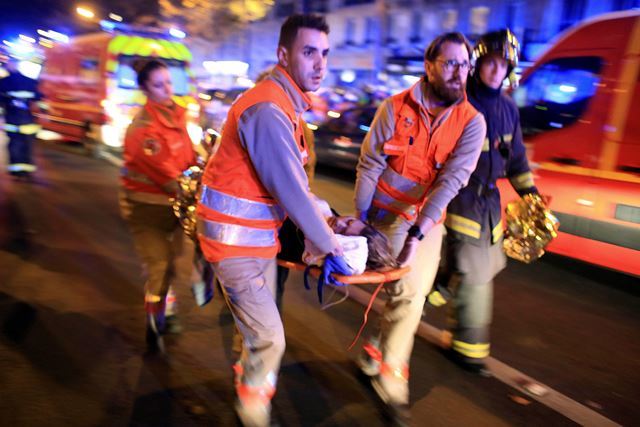
THREE in four Brits fear a deadly terrorist attack will wreak havoc on home soil in the next year, a Sunday Post poll has revealed.
And almost two in five are now afraid of going abroad on holiday for fear of getting caught up in an atrocity.
The revelations come as Prime Minister David Cameron steps up his campaign to garner support for the bombing of IS fanatics in Syria.
The exclusive YourViewK survey has found striking evidence that many people no longer feel safe in their own towns and cities, in the wake of the murder of 130 people in Paris a fortnight ago.
Asked how likely it is a significant terrorist attack will take place on the UK in the next 12 months, 45% said it was “likely” and 30% opted for “very likely”.
A similar amount, 47%, now feel more at risk since the Paris massacre, compared with just over 1% who said they felt safer.
The Paris attacks and gun rampage in Tunisia, which killed 30 Brits in July, have also left 38% more fearful of foreign travel.
Colonel Richard Kemp, head of the International Terrorism Intelligence Team at the Cabinet Office and chairman of the Cobra Intelligence Group between 2002 and 2006, said: “I think people are right to be concerned.
“There are places that have been safe but no longer are, we saw that in Tunisia but I don’t think people should be frightened to the point of not going just so long as they are selective.”Last week Mr Cameron set out his arguments to expand the UK’s bombing campaign, currently limited to Iraq, during an exhaustive debate in the House of Commons.
The issue has sparked a war of words in the Labour party, after leader Jeremy Corbyn wrote to all his MPs to make it clear he rejected Mr Cameron’s case for bombing.
It is understood members of the shadow cabinet threatened to resign unless they were given a free vote. Our poll revealed more people backed the Prime Minister, with 44% agreeing the UK should bomb Syria, compared with 32% who were against it.However, the calls to send ground troops into the region were firmly rejected. A resounding 54% said no against just 22% in favour.
Perhaps one of the most significant findings was the respondents’ attitude towards world and domestic leaders. When asked to rate the handling of the threat of terrorism by five politicians, Mr Cameron was given the highest average approval rating.
More than 33% regarded his performance as “excellent” or “good” compared to 38% who said it was “poor” or “very poor”.
He was followed by Russian premier Vladimir Putin with a 28% average approval rating, Nicola Sturgeon at 24% and US President Barack Obama at 23%.
Labour’s Jeremy Corbyn was bottom of the pile with just 11% of respondents rating his performance as “excellent” or “good” and 66% branding it “poor” or “very poor”.
Meanwhile, domestic security concerns appear to be splitting opinion among Brits, including the toxic issue of police officers carrying guns.
Last week the Scottish Police Federation claimed the country was “woefully under-equipped, under-resourced and under-prepared” for a Paris-style attack.
In response Police Scotland’s Assistant Chief Constable Bernard Higgins revealed elite soldiers from the SAS have been working with the police to plan for any similar attack.
The Scottish Government has reiterated it does not support the routine arming of the police.Our survey found 49% did not want more armed police officers on the streets, compared with 38% who said they did.
Security expert Stuart Crawford, a former lieutenant-colonel who spent 20 years in the Army, said he shared the public’s concerns.
“I would always prefer police not to be armed,” he said.
“One of the arguments against it is that if you arm the police habitually, the criminals will arm themselves and you escalate the use of firearms.
“But against jihadists clearly the police do have to be armed.”
The survey of more than 400 people, which was carried out between November 25 and 27, showed the nation was also split over whether the UK government has done enough to protect against a Paris-style attack, with 28% agreeing it has, compared with 30% who said it hadn’t.World on the brink of war against Islamic State – to read more, click here But Scottish Conservative MSP Alex Johnstone, defended the Government’s record.
He said: “It’s no wonder people’s fears are heightened after a horrendous attack like the one we saw in Paris.That is why the UK Government has swung into action as quickly as it has.”
Despite fears over security only 26% said they would accept cuts in public services to pay more for security measures.
Mazhar Khan, of the Muslim Council of Scotland, said it was now vital communities remained united against terrorism.
“Sadly in terms of where we are and what we saw in Paris, there is a risk and it could impact on us.
“What we should be doing is remaining vigilant and we should not allow the terrorists to divide us.”
A spokesman for the Home Office said it’s determined to detect and disrupt all terrorist threats.

Enjoy the convenience of having The Sunday Post delivered as a digital ePaper straight to your smartphone, tablet or computer.
Subscribe for only £5.49 a month and enjoy all the benefits of the printed paper as a digital replica.
Subscribe